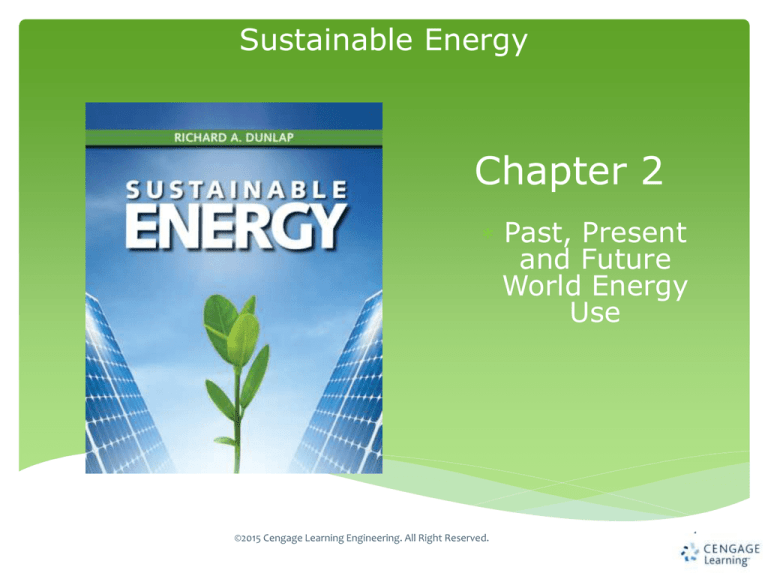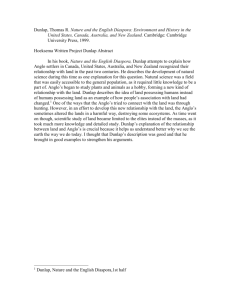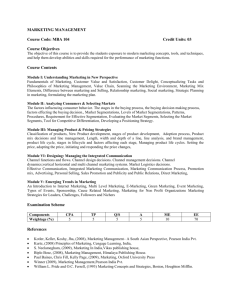
Sustainable Energy
Chapter 2
Past, Present
and Future
World Energy
Use
©2015 Cengage Learning Engineering. All Right Reserved.
1
Sustainable Energy
Dunlap
Learning Objectives
●
●
●
●
●
●
●
●
●
●
●
The energy needs of humanity throughout history.
The current energy distribution and relationship to
economic, geographical, climate, and industrial factors.
The principles of exponential growth.
The Hubbert model of resource utilization.
Resource limitations to energy production and use.
Limits of technology on energy production and use.
Economic factors that limit energy use.
Social factors affecting energy production.
Environmental aspects of energy use.
Political factors affecting energy use.
The integration of new energy technologies with existing
technology.
©2015 Cengage Learning Engineering. All Right Reserved.
2
Sustainable Energy
Dunlap
Average power consumption per capita
©2015 Cengage Learning Engineering. All Right Reserved.
3
Sustainable Energy
Dunlap
Breakdown of primary energy sources
in the United States
©2015 Cengage Learning Engineering. All Right Reserved.
4
Sustainable Energy
Dunlap
Primary U.S. energy sources
Major energy source
• Wood until late 1800s
• Coal late 1800s to about 1950
• Petroleum since 1950
©2015 Cengage Learning Engineering. All Right Reserved.
5
Sustainable Energy
Dunlap
Energy use per capita in different countries
©2015 Cengage Learning Engineering. All Right Reserved.
6
Sustainable Energy
Dunlap
Factors affecting energy use
Direct relationship between per capita GDP and per capita
energy use
Other factors affecting per capita energy use
• Climate
• Population density
• Types of industry
©2015 Cengage Learning Engineering. All Right Reserved.
7
Sustainable Energy
Dunlap
Annual energy use in the United States
Breakdown of primary energy sources and end use
Note: almost 60% of primary energy is lost due in conversion
processes (mostly due to efficiency of heat engines)
©2015 Cengage Learning Engineering. All Right Reserved.
8
Sustainable Energy
Dunlap
Per capita primary energy use
Typical single family (two individuals) primary energy use
(typical of Northern United States)
gasoline for transportation 9.8×1010 J
oil for residential heating 1.04×1011 J
electricity (at 40% efficiency) 1.1×1011 J
This gives a total average power consumption per person of
5.0 kW
This is less than 1/2 of the actual number
Remainder is used by industry/business/government etc.
©2015 Cengage Learning Engineering. All Right Reserved.
9
Sustainable Energy
Dunlap
Growth
In order to extrapolate energy use into the
future we need to understand how to model
growth.
©2015 Cengage Learning Engineering. All Right Reserved.
10
Sustainable Energy
Linear growth
Linear growth is described as
©2015 Cengage Learning Engineering. All Right Reserved.
11
Dunlap
Sustainable Energy
Dunlap
Exponential growth
Exponential growth is described as
This may be integrated to give
©2015 Cengage Learning Engineering. All Right Reserved.
12
Sustainable Energy
Dunlap
Exponential growth
©2015 Cengage Learning Engineering. All Right Reserved.
13
Sustainable Energy
Dunlap
Semi-log plot of exponential growth
It is often convenient to present a quantity that grows
exponentially on a semi-log plot
©2015 Cengage Learning Engineering. All Right Reserved.
14
Sustainable Energy
Dunlap
Doubling time
For exponential growth the doubling time is expressed as
For small growth rates the growth rate (in % per unit time)
may be expressed as
©2015 Cengage Learning Engineering. All Right Reserved.
15
Sustainable Energy
Dunlap
Examples of growth rates and doubling times
©2015 Cengage Learning Engineering. All Right Reserved.
16
Sustainable Energy
Dunlap
Some examples of growth
World population since year 1000
©2015 Cengage Learning Engineering. All Right Reserved.
17
Sustainable Energy
Dunlap
Extrapolation of world population
Assuming exponential growth at 1.6% per year
©2015 Cengage Learning Engineering. All Right Reserved.
18
Sustainable Energy
Dunlap
Sustainable world population
Current world population is about 7 billion
Estimates of sustainable world population, probably not
much more than 10 billion
Current growth rate cannot continue for very long
©2015 Cengage Learning Engineering. All Right Reserved.
19
Sustainable Energy
Dunlap
Actual population growth
©2015 Cengage Learning Engineering. All Right Reserved.
20
Sustainable Energy
Dunlap
Future world energy use
Increase in world energy use is due to
• increase in world population
• increased per capita energy use
Exponential growth of world population cannot continue at
the same rate.
Increased per capita energy use is due mostly to increase
in developing countries.
©2015 Cengage Learning Engineering. All Right Reserved.
21
Sustainable Energy
Dunlap
Predicted energy trends in some
countries
©2015 Cengage Learning Engineering. All Right Reserved.
22
Sustainable Energy
Dunlap
Energy use
in OECD and non-OECD countries
OECD includes (U.S., Canada, U.K, Japan, France, Germany, etc.)
non-OECD includes (China, India, Russia, Brazil, etc.)
©2015 Cengage Learning Engineering. All Right Reserved.
23
Sustainable Energy
Dunlap
Hubbert model
Developed by M. King Hubbert in 1956
General assumptions
• When it is first realized that a resource is useful, the
utilization of that resource begins slowly. This is because
efficient procedures for utilizing the resource and an
appropriate infrastructure need to be developed.
• Once the appropriate infrastructure has been developed,
resource utilization increases.
• When the resource becomes scarce, utilization decreases
and eventually stops.
©2015 Cengage Learning Engineering. All Right Reserved.
24
Sustainable Energy
Dunlap
Quantity if resource used per unit time
©2015 Cengage Learning Engineering. All Right Reserved.
25
Sustainable Energy
Dunlap
Total quantity of resource used
Total quantity used is the integral of the quantity per unit time
©2015 Cengage Learning Engineering. All Right Reserved.
26
Sustainable Energy
Dunlap
Challenges for sustainable energy
development
• Availability of the necessary resources.
• Availability of the necessary technology.
• Consideration of economic factors.
• Consideration of social factors.
• Environmental impact.
• Consideration of political factors.
• Ability to integrate new technology with existing technology.
©2015 Cengage Learning Engineering. All Right Reserved.
27
Sustainable Energy
Dunlap
Availability of the necessary
resources
A number of alternative energy technologies require
materials with limited availability.
Some examples of materials that may be a concern are
•
•
•
•
Lithium for fusion energy
Lithium for rechargeable batteries
Rare earth elements for generators
Indium, gallium and selenium for photovoltaic cells
©2015 Cengage Learning Engineering. All Right Reserved.
28
Sustainable Energy
Dunlap
Materials production for photovoltaics
Comparison of current annual production of some materials of
relevance to photovoltaic cells and requirements to fulfill world
energy needs
©2015 Cengage Learning Engineering. All Right Reserved.
29
Sustainable Energy
Dunlap
Availability of the necessary
technology
Development of high temperature superconductors for
generators and power distribution lines is an example of a
new technology that is important for alternative energy
technologies.
©2015 Cengage Learning Engineering. All Right Reserved.
30
Sustainable Energy
Dunlap
High temperature superconductors
High temperature superconducting wire for power distribution
or superconducting magnet use
©2015 Cengage Learning Engineering. All Right Reserved.
31
Sustainable Energy
Dunlap
Some technological challenges for
alternative energy production
• New organic photovoltaic cells that are reasonably efficient
and are much more cost-effective than conventional
semiconductor based materials (Chapter 9).
• Suitable economical membranes for the exploitation of
salinity gradient or osmotic energy (Chapter 14).
• Methods for production of cellulosic ethanol (Chapter 16).
• Efficient non-lithium-based secondary batteries that will
provide a cost-effective basis for widespread electric
vehicle development (Chapter 19).
• Economical and efficient methods for direct hydrogen
production (e.g., solar hydrogen, Chapter 20).
©2015 Cengage Learning Engineering. All Right Reserved.
32
Sustainable Energy
Dunlap
Consideration of economic factors
Commercialization of energy technologies requires a
consideration of economics.
Ultimately technologies must be competitive in order to
be attractive to producers and consumers.
Cost per unit electricity generated must include three
components
• Cost of fuel
• Cost of infrastructure operation and maintenance
• Initial infrastructure cost amortized over its lifetime
©2015 Cengage Learning Engineering. All Right Reserved.
33
Sustainable Energy
Dunlap
Fuel and operating costs
Fuel and operating cost are more significant for some
technologies than others.
For example: fuel cost is important for coal, natural gas
and nuclear but is not a factor for hydroelectric, wind and
solar.
Operating costs are relatively low for technologies such as
hydroelectric but can be significant for example for nuclear
(where waste disposal is an important factor).
©2015 Cengage Learning Engineering. All Right Reserved.
34
Sustainable Energy
Dunlap
Infrastructure costs
©2015 Cengage Learning Engineering. All Right Reserved.
35
Sustainable Energy
Dunlap
Overall cost per kWh
©2015 Cengage Learning Engineering. All Right Reserved.
36
Sustainable Energy
Dunlap
Electricity cost in some countries
Variations
between countries
can result from
different
generating
methods and also
from national
economics.
©2015 Cengage Learning Engineering. All Right Reserved.
37
Sustainable Energy
Dunlap
Consideration of social factors
Public opinion can influence the development of certain
technologies and government energy policy.
Nuclear energy has generated more public interest than
most other energy approaches.
©2015 Cengage Learning Engineering. All Right Reserved.
38
Sustainable Energy
Dunlap
Public approval of nuclear power
in the U.S.
©2015 Cengage Learning Engineering. All Right Reserved.
39
Sustainable Energy
Dunlap
Effects of nuclear incidents on public
opinion
Public approval of nuclear power generally diminishes
after an incident
©2015 Cengage Learning Engineering. All Right Reserved.
40
Sustainable Energy
Dunlap
Importance of different factors in
forming public opinion
Cost is a major factor for public opinion
©2015 Cengage Learning Engineering. All Right Reserved.
41
Sustainable Energy
Dunlap
Public preference for energy
technologies
Despite the importance
of cost, public opinion
favors solar energy
©2015 Cengage Learning Engineering. All Right Reserved.
42
Sustainable Energy
Dunlap
Environmental impact
Renewable energy sources can contribute to greenhouse
gas emissions in two ways
• During the processing of materials and manufacture
of the infrastructure. This can be substantial
because of the low energy density of most
renewable sources.
• During the operation of the facility. This is usually
small.
©2015 Cengage Learning Engineering. All Right Reserved.
43
Sustainable Energy
Dunlap
Greenhouse gas (CO2) emissions from
different energy sources
©2015 Cengage Learning Engineering. All Right Reserved.
44
Sustainable Energy
Dunlap
Consideration of political factors
National energy policies generally deal with issues such as
• A description of national policies concerning energy
generation, transmission and use
• The establishment of energy efficiency and
environmental standards related to energy use
• The specification of energy-related fiscal policies,
including subsidies, incentives, tax exemptions, and
the like, to promote improved energy utilization
• The participation in funding programs for energy-related
research and development
• The development of energy-related treaties and
agreements with other countries
©2015 Cengage Learning Engineering. All Right Reserved.
45
Sustainable Energy
Dunlap
Factors influencing energy policy
Details of energy policies depend on such factors as
• Economy.
• Climate.
• Geography.
• Natural resources.
• Population.
©2015 Cengage Learning Engineering. All Right Reserved.
46
Sustainable Energy
Dunlap
Ability to integrate new technology
with existing technology
Development of new technologies requires development of
new infrastructure.
Transitions between technologies need to avoid disruptions.
©2015 Cengage Learning Engineering. All Right Reserved.
47
Sustainable Energy
Dunlap
Distribution infrastructure
Particularly important for transportation technologies
• Electric vehicles require charging stations
• Hydrogen vehicles require hydrogen fueling stations
©2015 Cengage Learning Engineering. All Right Reserved.
48
Sustainable Energy
Dunlap
Summary
• Human energy use has increased over the years
• Traditionally wood was the source of energy and this was replaced
first by coal and then by petroleum
• Per capita energy consumption is directly related to per capita GDP
• About 60% of primary energy is rejected as waste heat
• Human population has grown exponentially but the growth rate is
declining
• The greatest increase in energy use at present is in developing
countries
• The Hubbert model describes the utilization of a limited resource
• Development of new energy sources needs to consider
o Resource limitations
o Technological limitations
o Economic factors
o Social factors
o Environmental factors
o Political factors
o Integration with existing technology
©2015 Cengage Learning Engineering. All Right Reserved.
49



